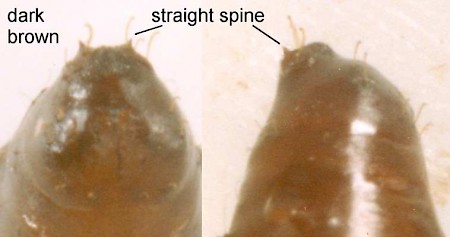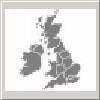49.049 BF1024
Light Grey Tortrix Cnephasia incertana
(Treitschke, 1835)
Wingspan 14-18mm.
One of several similar Cnephasia species but also one of the smallest.
It is quite common throughout much of the British Isles, and the adults are at large during June and July.
The habitat preference is for woodland edges and hedgerows, and the overwintering larvae feed in a spinning on a range of herbaceous plants such as plantain (Plantago) and sorrel (Rumex).
Larva: (description Ian F. Smith)
Foodplants: Polyphage. Over 200 plant species recorded, including Ranunculus, Teucrium, Rumex, Lotus, Plantago and Malus. In spun leaves September - May and June.
Length: 10 mm described.
Head: Burnt ochre. Posterior dark brown. Mouthparts dark brown. Large black postero-lateral mark. Frons thinly edged brown. Stemmatal area black.
Prothorax (T1): Anterior translucent whitish dorsally. Black prespiracular and subventral pinacula. Prothoracic shield black, divided by transparent medial line showing burnt ochre head colour.
Thoracic legs: Shiny black.
Body: Finely shagreened. Greenish grey. Paler ventrally.
Spiracles: Black peritreme.
Pinacula: Small. Consisting of a fine black setal spot with a narrow sclerotised shiny grey periphery.
Setae: Grey translucent.
Anal segment: Anal comb of about five long black prongs. Anal plate shiny black (at all instars).
Prolegs: Base coloured as venter. Planta concolorous basally, grey band round middle, whitish translucent distally. Crochets black. Large grey-black lateral sclerite on anal proleg.
Pupa: Blackish brown. Cremaster has two very short spines which are not curved.
Similar species: The anal plate of C. asseclana is similar (black) until the larva is about 9 mm, when it develops a pale anterior sector enclosed by a broad black horseshoe. The pale sector eventually becomes light brown. The cremaster spines on the light brown pupa of C. asseclana are longer and distinctly curved.

 UKMoths
UKMoths 






